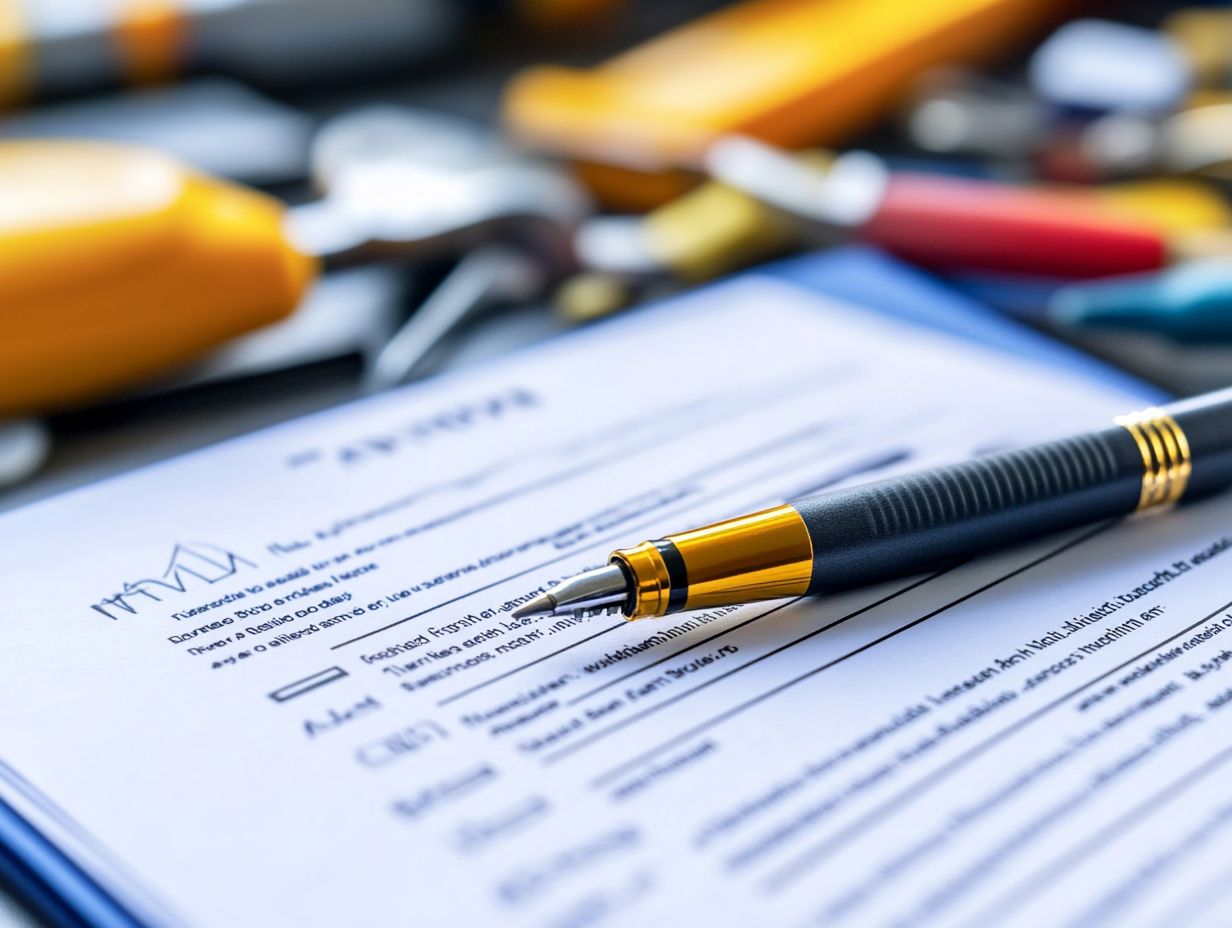What to Know About Warranty Terms and Duration
When you invest in a product, understanding the nuances of warranty terms can greatly enhance your experience and provide peace of mind.
This article lets you discover the must-know details of warranties, covering definitions, various types such as manufacturer, extended, and implied along with the duration of coverage and the factors that can influence it.
You ll find practical tips designed to help you maximize the benefits of your warranty, ensuring you fully capitalize on your purchase.
Immerse yourself in this knowledge to become a discerning consumer!
Contents
Key Takeaways:

- Warranties come in different types, including manufacturer, extended, and implied warranties. It is important to understand the coverage and limitations of each type.
- The length of warranty coverage and expiration dates vary depending on the type of warranty. Factors such as product type and usage can affect this.
- To maximize warranty coverage, properly maintain products and follow the manufacturer’s guidelines. Consider extending warranties for longer coverage periods.
Understanding Warranty Terms
Understanding warranty terms is essential for you as a consumer. They include important details that safeguard your rights and ensure products perform as promised.
A warranty is a commitment from the manufacturer or seller to repair or replace a product when necessary, outlining specifics such as warranty coverage, warranty period, and any exclusions that may apply.
By getting to know these terms, you empower yourself to navigate warranty claims with confidence, identify warranty obligations, and grasp the conditions that could affect your warranty rights.
Types of Warranties
You ll encounter several types of warranties, such as manufacturer warranties, extended warranties, and implied warranties, each designed to provide varying levels of consumer protection and coverage for your purchased products.
A manufacturer warranty offers you peace of mind that comes directly from the producer, ensuring that the item meets their standards. In contrast, an extended warranty provides extra coverage, extending beyond the typical warranty period.
Implied warranties assure you that products will adhere to minimum quality standards, even if those standards aren t explicitly outlined by the seller.
Manufacturer, Extended, and Implied Warranties
Manufacturer warranties, extended warranties, and implied warranties are crucial for you to grasp the protection available as a consumer. Each type defines unique aspects of warranty coverage and claims processes.
These warranties fulfill distinct roles that directly impact your rights when dealing with defective products or services. Manufacturer warranties typically cover repairs or replacements for specific defects within a set time frame, ensuring you receive a reliable product.
On the other hand, extended warranties provide additional coverage that goes beyond what the manufacturer offers, often including repairs for wear and tear or damage from unexpected incidents elements that can significantly enhance your peace of mind.
Implied warranties, usually enforced by law, ensure that a product performs as expected for a reasonable period, safeguarding you from purchasing items that fall short of basic quality standards.
By understanding these nuances, you can navigate the claims process with confidence, being fully aware of the potential limitations that may arise with each type of warranty.
Duration of Warranties

The duration of warranties, commonly known as the warranty period, varies significantly based on the product, warranty terms, and the manufacturer’s policies. This variation directly influences warranty coverage and shapes consumer expectations.
While some products are accompanied by a limited warranty period, others may provide extended options, offering enhanced protection for consumers.
Length of Coverage and Expiration Dates
The length of coverage for a warranty is typically laid out in the warranty period, detailing how long you can expect to receive warranty services (the help you get for repairs) and repairs, along with any relevant expiration dates. Grasping these specifics can save you from headaches down the line when it comes time to file a warranty claim (a request for repair under the warranty).
Warranty periods are generally determined by the manufacturer s policies and the anticipated lifespan of the product, often ranging from one year to several years. While expiration dates often coincide with your purchase date, it is essential for you to scrutinize the specific details; certain conditions may impact your coverage.
To confirm warranty details, you can always refer to the documentation that accompanied your purchase. This usually outlines the coverage length, renewal options, and specific terms. Keeping a close eye on your warranty coverage is crucial; it can save you both time and money when unexpected repairs come knocking at your door.
Factors Affecting Warranty Duration
Several factors influence the duration of warranties, including the type of product, the specific conditions attached to the warranty, and the obligations that both manufacturers and sellers impose on you as a consumer. These elements significantly affect your overall protection.
To navigate warranty claims effectively and make informed purchasing decisions, it s essential for you to understand these variables.
Product Type and Usage
The type of product you choose significantly shapes the warranty coverage you’ll receive, as various categories come with their own distinct terms and maintenance requirements. This directly influences your expectations as a consumer.
Take electronics, for example. They often come with a one-year manufacturer s warranty, which generally covers parts and labor for defects but tends to exclude issues arising from user mishaps. This highlights why you should use these devices carefully!
In contrast, vehicles typically offer a robust warranty package that can span several years or a set mileage, providing you with peace of mind regarding major repairs. Appliances present a different scenario, as they may feature both limited and extended warranties, emphasizing the need for regular maintenance checks to keep your coverage intact.
Understanding these nuances is vital for you as a consumer. Proper usage and timely servicing can ensure that your valuable warranties remain valid throughout the lifespan of your products.
Maximizing Warranty Coverage

Maximizing warranty coverage demands a solid grasp of warranty terms and proactive strategies to facilitate seamless claims when necessary. This ultimately extends the longevity of your warranty period.
By adhering to specific tips, you can safeguard your warranty rights and fully enjoy the advantages your warranty offers.
Tips for Extending and Maintaining Warranties
To effectively extend and maintain warranties, it s essential for you to grasp the significance of warranty maintenance, documentation, and the process for filing claims. This knowledge keeps your warranty rights protected.
- Start by keeping all purchase receipts, installation records, and servicing documents organized and secure.
- Regularly review your warranty terms; each warranty may come with specific conditions, such as maintenance schedules or usage restrictions, that you must follow.
- Consider setting calendar reminders for important dates, like the warranty expiration or necessary maintenance checks.
By proactively monitoring and documenting all relevant information, you can confidently navigate the warranty landscape and maximize your protection against potential issues.
Frequently Asked Questions
What Should You Know About Warranty Terms and Duration?
Warranty terms explain what is covered and how long the coverage lasts. Understanding these details helps you know your rights and responsibilities.
What is a warranty?

A warranty is a promise from the manufacturer or seller. It ensures repair or replacement of a product if it is defective within a specific time frame.
What are the different types of warranties?
There are three main types of warranties. These are express, implied, and extended.
Express warranties are clearly stated. Implied warranties are automatically provided by law. Extended warranties are often sold separately.
What is the duration of a warranty?
The duration of a warranty varies by type and product. It can last from a few months to several years.
What is covered under a warranty?
The coverage of a warranty can vary, but generally it includes defects in materials or workmanship.
Some warranties may also cover normal wear and tear or specific parts of a product.
Are there any limitations or exclusions to a warranty?
Yes, warranties often have limitations. These can include misuse, unauthorized repairs, or damage from natural disasters.
Don’t skip the fine print! Understanding the warranty terms will help you know what s covered.





